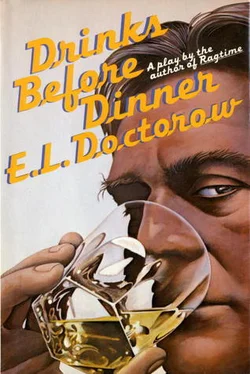Edgar Doctorow - Drinks Before Dinner
Здесь есть возможность читать онлайн «Edgar Doctorow - Drinks Before Dinner» весь текст электронной книги совершенно бесплатно (целиком полную версию без сокращений). В некоторых случаях можно слушать аудио, скачать через торрент в формате fb2 и присутствует краткое содержание. Год выпуска: 2011, Издательство: Random House, Жанр: Драматургия, на английском языке. Описание произведения, (предисловие) а так же отзывы посетителей доступны на портале библиотеки ЛибКат.
- Название:Drinks Before Dinner
- Автор:
- Издательство:Random House
- Жанр:
- Год:2011
- ISBN:нет данных
- Рейтинг книги:4 / 5. Голосов: 1
-
Избранное:Добавить в избранное
- Отзывы:
-
Ваша оценка:
- 80
- 1
- 2
- 3
- 4
- 5
Drinks Before Dinner: краткое содержание, описание и аннотация
Предлагаем к чтению аннотацию, описание, краткое содержание или предисловие (зависит от того, что написал сам автор книги «Drinks Before Dinner»). Если вы не нашли необходимую информацию о книге — напишите в комментариях, мы постараемся отыскать её.
Drinks Before Dinner — читать онлайн бесплатно полную книгу (весь текст) целиком
Ниже представлен текст книги, разбитый по страницам. Система сохранения места последней прочитанной страницы, позволяет с удобством читать онлайн бесплатно книгу «Drinks Before Dinner», без необходимости каждый раз заново искать на чём Вы остановились. Поставьте закладку, и сможете в любой момент перейти на страницу, на которой закончили чтение.
Интервал:
Закладка:
JOAN What are you trying to do? Put it away, please. What is it you want? What is it you hope for? When will you relent?
( Pause )
ANDREA But you remind me of a story of the street and it happened today. I was on Fifth Avenue and I saw a young man standing on a corner. Edgar, he was a poet selling his poems that he had written and printed himself on broadsheets. He was a poet standing on the corner along with the peddlars of leather belts and strings of beads and watercolors of lions and tigers, but he had no luck selling his wares because the people walking somehow walked too quickly to be able to read a poem and like it and make a decision to buy it as they might buy a belt or beads or a watercolor. Perhaps he could see, of the lightly dressed girls passing him and ignoring him, their intrauterine devices. But he noticed not only that the girls ignoring him but that everyone ignoring him, walking and strolling and carrying their lunch in paper bags to the park or the slightly raised plazas of banks and corporations, was moving faster than the automobile traffic in the street. In fact, the traffic wasn’t moving at all. So this enterprising young man turned his back to the people walking on the sidewalk, and took his poems out into the street into the traffic jam, and he began to sell them to the people sitting behind their steering wheels not going anywhere. And, you know, he did quite well!
(EDGAR smiles. At this moment the children are heard, giggling, just out of sight )
EDGAR ( Playfully ) Do I hear those naughty children?
( Everyone looks toward the sound of the laughter )
Curtain
SCENE 2
( As before. But the two children, in their bathrobes, are onstage as well . EDGAR, holding the gun, is totally absorbed in his thoughts )
EDGAR Your poet knew something, Andrea. We have our life in cars. We eat our meals in cars, we pay our bills from cars, we hear the news of the world — so why not take our poetry sitting behind the wheels of our cars. In cars we have conversation not otherwise possible — conversation more intimate than what is permissible when, as now, people face each other. There is an intimacy of conversation in cars produced by the fact that we sit together but face in the same direction. We watch the road and see the state of mind of what we say imposed upon the road. We drive our cars down the interstate while our lives go on inside them. But this is not to say we cannot see things from cars. We become aware of other drivers in their most acute moments of personal expression. In our cars on the roads and in the streets we are made aware of the endless numbers of wills like our own, the infinite number of equally powered antagonistic wills, and apparently I am the kind of driver who habitually creates in others acute moments of personal expression. These moments are quite interesting. You look in the rear-view mirror, although if you think about it, all mirrors are rear-view mirrors, but as I say, you see there on this small field of vision an acute expression of character on the part of the stranger in his car behind you. And what he does as you slow for a turn without giving signal is throw his arms up in a gesture of despair, lifting his head and opening his mouth in what looks to be some sort of howl. In a car we gather impressions of another person’s character from minimal information, but we make our judgments nonetheless. I love the sleek and souped-up car filled with boys and girls that tears by recklessly and cuts you off with unerring scornful precision. That is character. I have seen old men drive with great dignity in old cars, wavering at slow speeds as the memory of their lives wavers. And in city traffic in hot weather you may see from your stalled lane the drivers sitting there without moving in the opposite direction. In this situation there is some embarrassment, considerable close examination is possible, moments of communion or recognition for the idiocy or pretense or unimportance of our lives. A sense of our mutual victimization in the system of cars. We look frankly into each other’s windows. I notice a high proportion of women doing city driving of this kind. Older women tend to sit at the wheel in a kind of hunch that suggests permanent deformation. Young women with sunglasses lying as fashionpieces in the crown of their hair may appear to ignore you but examine your fender, your trim, your aerial. Women who drive tend to lose their attractiveness as women to the driver’s expressions. They are not primarily women but primarily drivers. As for those cars with families, they appear to me as genetic traps. Cars with families are particular contraptions for the entrapment of certain similar beings with similar facial structures. That is what they seem to me. The members of the genetically trapped family look out of the car with identical eyes and at the same instant, and all the miseries of biological relationship are arranged on their faces. If they are laughing and one of them has a brutish face they all have brutish faces. Different sizes of the same brutish face are laughing. So cars suggest to me the dreariness of biology, the predictability of the plan of mindless excess by which we reproduce ourselves. Sometimes the children you see in cars seem to understand this, they understand communication between cars is possible, they don’t pretend it doesn’t exist as adults do, they welcome it, they want it, and they wave at you from the backs of station wagons or the rear seats of sedans. At such moments you see the children calling for freedom of themselves from genetic entrapment. They wave and could as easily be your own children. You wave back. I always wave back at the freedom of small creatures who understand for a moment how we all long to be released from our genetic traps, who understand how arbitrary is our relationship to others with the same features, how we all know each other by waving from our windows, how by just as easy a set of arbitrary genetic circumstances we could all be each other.
( During this speech everyone else has drifted away from EDGAR, and regrouped so that he is left isolated on one side of the room )
CLAUDETTE I wonder, with your sensitive feeling for children, if we shouldn’t allow these children to return to bed. They are tired and should be asleep by now.
EDGAR They don’t look tired. They look rather interested. You always wave, don’t you?
BOY Yes.
GIRL What kind of car do you have?
EDGAR A good question. I drive an obscure, not-quite-working foreign car to express alienation. There are only tens of thousands on the road.
JOEL It’s true that we extend our persons in our cars. I fail to see why that is terrible. In any event, it is inevitable. Everything we make is modeled on ourselves. The common valve is a mechanization of the sphincter, household plumbing mimics the bowels, and cameras are mechanical eyes. Our computers take our minds for the model and produce thought outside of our bodies. Every technical human achievement redesigns the self, recreates it, and projects it. How could it be otherwise?
EDGAR ( Laughing ) As the arm hurling a stone becomes — a gun.
( He swings his arm and points the gun toward the doorway. At the same moment the MAID enters, stops in her tracks )
JOAN Edgar, please, I find that frightening.
( Pause )
MICHAEL You said you bought that gun. Why?
EDGAR Well, that’s the point, I don’t know why. I bought it without planning to, I bought it with no thought for guns or weapons of any kind until the moment the opportunity was given to me to buy it. Children, where do you think I was when this gun was offered to me?
BOY In your car?
Читать дальшеИнтервал:
Закладка:
Похожие книги на «Drinks Before Dinner»
Представляем Вашему вниманию похожие книги на «Drinks Before Dinner» списком для выбора. Мы отобрали схожую по названию и смыслу литературу в надежде предоставить читателям больше вариантов отыскать новые, интересные, ещё непрочитанные произведения.
Обсуждение, отзывы о книге «Drinks Before Dinner» и просто собственные мнения читателей. Оставьте ваши комментарии, напишите, что Вы думаете о произведении, его смысле или главных героях. Укажите что конкретно понравилось, а что нет, и почему Вы так считаете.












